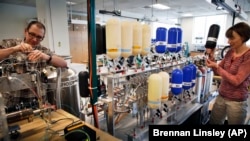Observers have long questioned the growing number of research journals that take fees from eager academics but often publish without rigorous review.
Biased authors, they say, are taking advantage of an overloaded assessment system, undermining the scientific evidence that provides the bedrock for climate action.
"The recent explosion of so-called 'predatory journals' is creating problems that are pro-actively explored by climate sceptics," said Carl Schleussner, a scientist at research group Climate Analytics.
"It opens the door to those who want to willingly get dubious research out there."
One study denied that human-driven warming was to blame for the melting of a Peruvian glacier and consequent flood risk.
Two of its authors are former executives of RWE, a German energy company targeted by a lawsuit over the glacier, and both are prominent climate contrarians.
Nathan Stansell, a palaeoclimatologist at Northern Illinois University, is one of the scientists whose work was cited in the German-led paper.
Two other scientists cited in the study, Ben Marzeion of the University of Bremen and Jorge Strelin of Cordoba University in Argentina, also told AFP their work was misused.
Strelin said the paper was "fraught with misinformation, mischaracterizations and bias," he told AFP.
It presented a "debunked argument that since it was warm in medieval times, then there was nothing alarming about recent warming.
The two ex-RWE men, lead author and geologist Sebastian Luening and chemist-turned-politician Fritz Vahrenholt, did not respond to AFP's requests to comment.
The author of the Oxford study, Rupert Stuart-Smith, submitted to the journal a formal scientific rebuttal of Luening's paper, contesting its use of certain data and detailing what he called "inaccurate or misleading assertions."
Elsevier communications executive Andrew Davis told AFP the journal's editors "did not detect unethical behaviours and it is their belief that the two research groups simply did not agree with each other."
But the publisher acknowledged the failure to include a disclosure of the authors' links to RWE in the study.
In September 2022, top climate scientists called for the withdrawal of a paper that claimed scientific evidence of a climate crisis was lacking.
The peer-reviewed paper by four Italian scientists appeared in the European Physical Journal Plus, from prestigious science publisher Springer Nature.
Four scientists told AFP the study manipulated data and cherry-picked facts about extreme weather events.
In response, Springer Nature put a warning notice on the article and said it was investigating.
Ivan Oransky, co-founder of Retraction Watch, a blog that tracks thousands of withdrawals of academic papers each year, told AFP some authors sought to get unsound work published in journals with a lax peer-review system that used unqualified reviewers.
"A lot of junk gets through peer review," he said. "It is really time that everybody admitted that, so that we can try and do better."
